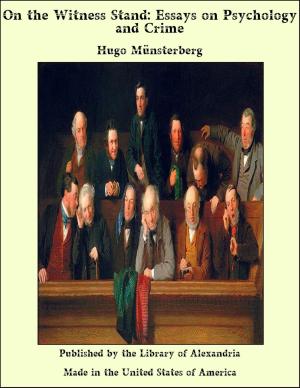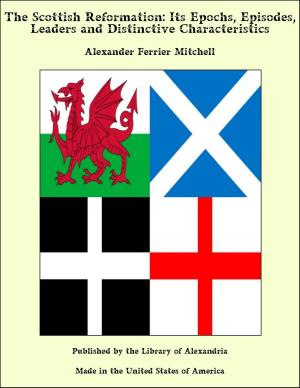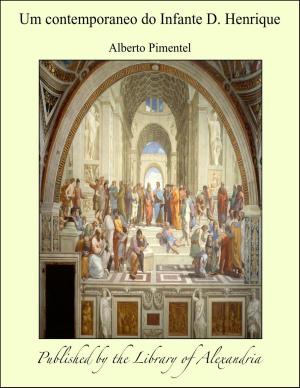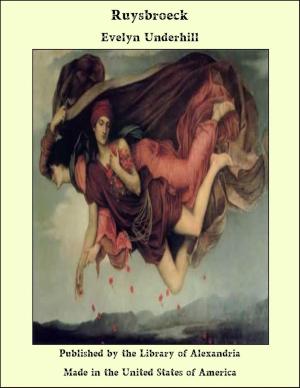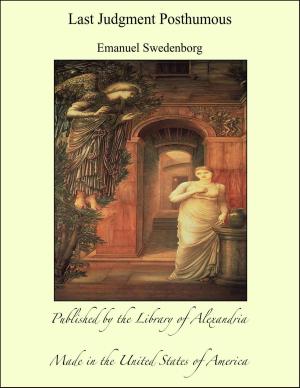The Days of Chivalry: The Legend of Croquemitaine
Nonfiction, Religion & Spirituality, New Age, History, Fiction & Literature| Author: | Ernest Louis Victor Jules L'Epine | ISBN: | 9781465608000 |
| Publisher: | Library of Alexandria | Publication: | March 8, 2015 |
| Imprint: | Language: | English |
| Author: | Ernest Louis Victor Jules L'Epine |
| ISBN: | 9781465608000 |
| Publisher: | Library of Alexandria |
| Publication: | March 8, 2015 |
| Imprint: | |
| Language: | English |
THE story which I am about to relate happened (if it ever did happen) in the time of the famous Emperor Charlemagne. There is no necessity, in speaking of that remarkable epoch, to invent facts. The truth is so astounding that it will make you open your eyes quite wide enough. What marvellous doings of fairies, ogres, or demons, can compare with the deeds of Charlemagne? and what magic ring could be as potent as his sword? But before I proceed further it will be as well to sketch for you, in a few lines, the portrait of this hero. He was eight feet in height, according to the measurement of his own feet, which historians allege with fervour were of remarkable length. His eyes were large and piercing. When he was enraged you could almost have fancied they flashed fire. His face was broad and ruddy, his hair brown, and he wore a beard that was innocent of the barber's shears. Although he measured eight feet round the middle, his figure was wellproportioned. He devoured with ease at one repast a quarter of mutton, or a goose, or a ham, or a peacock. He was moderate in the matter of wine, which he used to take with water. His strength was so enormous that it was mere child's play to him to straighten with his naked hands three horse-shoes at a time. He could lift at arm's length, on the palm of his hand, a knight in full armour; and lie could cleave in twain, with one blow of his sword, a horseman in panoply of war—aye, and his horse into the bargain. This was mere sport to him, and often, with a charming complaisance which was peculiarly his own, he would take pleasure in thus giving those about him an ocular demonstration of his superhuman strength. His anger was as terrible as the thunder, for it was as ready to burst forth and to strike. He carves out a kingdom, with the compassion of a Titus, the sound judgment of a Solomon, the piety of a Joseph, the magnificence of a Sardanapalus, and the wisdom of an Æsop, he united two qualities more rare than all these put together? when he spoke he meant what he said, and when others spoke to him he took time for reflection, in order to make sure that he thoroughly understood their meaning. The dominion which his father bequeathed him did not suit the largeness of his views, so he carved out for himself a kingdom which was more in harmony with his gigantic instincts.
THE story which I am about to relate happened (if it ever did happen) in the time of the famous Emperor Charlemagne. There is no necessity, in speaking of that remarkable epoch, to invent facts. The truth is so astounding that it will make you open your eyes quite wide enough. What marvellous doings of fairies, ogres, or demons, can compare with the deeds of Charlemagne? and what magic ring could be as potent as his sword? But before I proceed further it will be as well to sketch for you, in a few lines, the portrait of this hero. He was eight feet in height, according to the measurement of his own feet, which historians allege with fervour were of remarkable length. His eyes were large and piercing. When he was enraged you could almost have fancied they flashed fire. His face was broad and ruddy, his hair brown, and he wore a beard that was innocent of the barber's shears. Although he measured eight feet round the middle, his figure was wellproportioned. He devoured with ease at one repast a quarter of mutton, or a goose, or a ham, or a peacock. He was moderate in the matter of wine, which he used to take with water. His strength was so enormous that it was mere child's play to him to straighten with his naked hands three horse-shoes at a time. He could lift at arm's length, on the palm of his hand, a knight in full armour; and lie could cleave in twain, with one blow of his sword, a horseman in panoply of war—aye, and his horse into the bargain. This was mere sport to him, and often, with a charming complaisance which was peculiarly his own, he would take pleasure in thus giving those about him an ocular demonstration of his superhuman strength. His anger was as terrible as the thunder, for it was as ready to burst forth and to strike. He carves out a kingdom, with the compassion of a Titus, the sound judgment of a Solomon, the piety of a Joseph, the magnificence of a Sardanapalus, and the wisdom of an Æsop, he united two qualities more rare than all these put together? when he spoke he meant what he said, and when others spoke to him he took time for reflection, in order to make sure that he thoroughly understood their meaning. The dominion which his father bequeathed him did not suit the largeness of his views, so he carved out for himself a kingdom which was more in harmony with his gigantic instincts.





